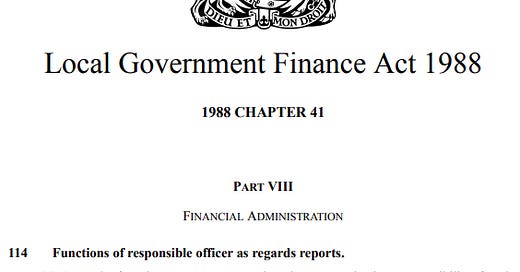Birmingham has more canals then Venice and more hills than Rome – you will be told – and it has the largest local authority in Europe and it is the only city in the United Kingdom, other than London, with a population of over a million.
And the city council now also has a section 114 notice – you can click here to read it.
The notice is under section 114(3) of the Local Government Finance Act 1988 (coincidentally the legislation that introduced the poll tax).
The provision is simple:
“The chief finance officer of a relevant authority shall make a report under this section if it appears to him that the expenditure of the authority incurred (including expenditure it proposes to incur) in a financial year is likely to exceed the resources (including sums borrowed) available to it to meet that expenditure.”
The report is worth reading in full as a snapshot of a council in trouble and as an account of how it got into that trouble.
I am a writing a longer piece about this, but I thought this would be a useful short post.




I can’t help comparing my home town, Birmingham, to Manchester, because I lived in the NW for a long time too. Manchester was the beneficiary of stable one party rule, with competent leaders and officers. Even the IRA accidentally did it a favour by blowing up the Arndale Centre, and kickstarting a renewal project.
Birmingham, conversely, was disinvested in by design over a long period, because it was growing too fast in the post-war period. But that’s another story. It also suffered from ever shifting politics in the Council House. Indeed, it was, I think, a Tory led council in 2012 when the Supreme Court decision on equal pay hit them.
The city is kind of a living metaphor for Britain. A Tory invention, initially dynamic (Gas and Water Socialism), but wrecked by the Conservatives being the dominant force over the city’s history.
May I ask if there is a relation to the worn out concrete problem? Is Birmingham responsible for funding school maintenance and therefore involved in the latest buildings problem? Would this limitation on expenditure prevent Birmingham from funding school repairs it would otherwise normally handle? That is, buildings safety would not fall under obligatory expenditure?